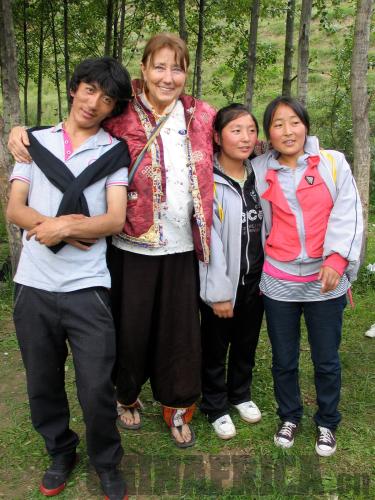|

What brought you to China to teach high school?
Actually, I once taught in Yushu County [also in Qinghai Province] in 1999 as a volunteer with Rokpa International, a Buddhist NGO based in Scotland. The experience had impressed me so much that I sought to find a way to come back and stay for a longer time.
Then I came to the high school in March 2003 as a volunteer teacher for Voluntary Service Overseas (VSO) [the largest non-governmental volunteer-sending organization in the world based in the United Kingdom].
After working as a volunteer with VSO for three years, I founded the English Training Program, which was later supported by The Bridge Fund of the United States.
Can you talk about your students?
My students are 15 to 22 years old and studying at senior middle school level. Many come from nomadic areas where primary schools are far away from their homes and thus they are older when they come to middle school.
These Tibetan students have a great sense of humor, warmth, generosity and brightness, which, I believe, is a reflection of their Buddhist upbringing.
They all work very hard. Some have made the most extraordinary progress and one student is presently studying on scholarship in the United States.
What are the conditions like at your school?
The school has very poor facilities, with only a blackboard and chalk in the classroom. On the program that I founded, however, with funding from different NGOs abroad, we were able to establish a small English library, equipped with a DVD collection, a photocopy machine, TV sets and more recently a computer room with 45 computers. The school has provided a room for the library. [It's] doing its best to support us in all ways possible.
Was it a challenge to adapt to the area? What are your impressions of the community and local people?
Coming from a hot country, my biggest challenge was how to adapt to the cold without getting sick. Another was the difficulty in learning the Tibetan language, in which I never feel I am proficient enough.
I was the first foreign teacher to teach at this school. When I first arrived, I was stared at no matter what I did or said.
Nowadays people seem to be busier. And more and more cars choke the roads where mules and donkeys were previously tied.
People are also more aware of the value of protecting their language, religion and traditions during this time of rapid development. Many local associations focusing on education and poverty alleviation have been formed to protect them.
Tibetan people are very sociable and it still surprises me how easily they can create a party that is enjoyed for hours and hours.
Most people in the surrounding villages live very modestly as farmers or small-scale traders and many nomads come into town to trade or to attend rituals in the monasteries. I am endlessly struck by their kindness and generosity.
Have you visited other places in China? What are your plans for the future?
I have explored only Qinghai Province, a little of Gansu Province and the Tibet Autonomous Region. Now I am about to leave here and return to South Africa. I need to reestablish contact with my own country. |